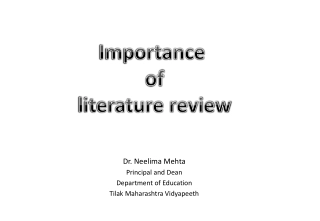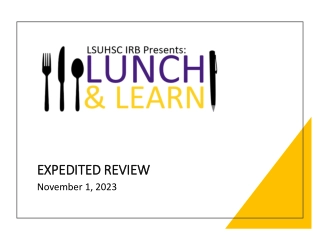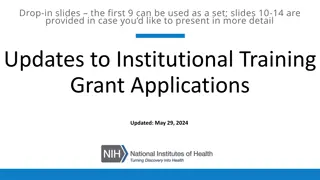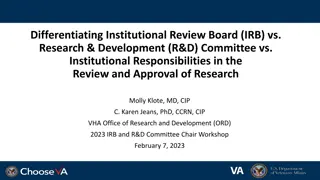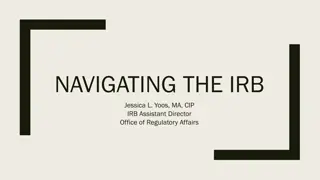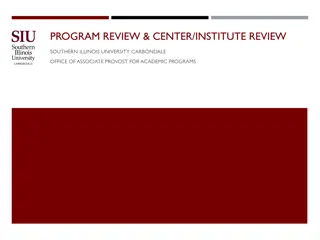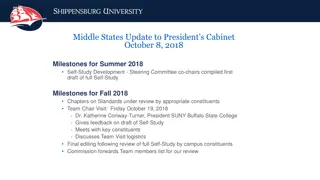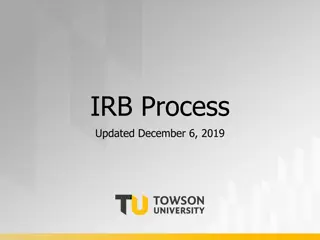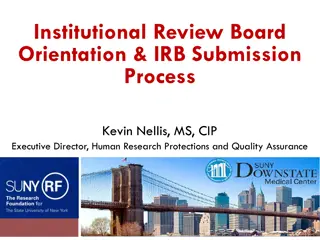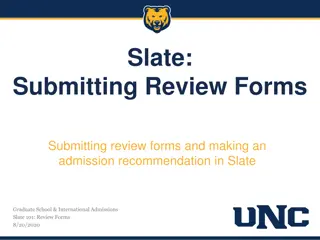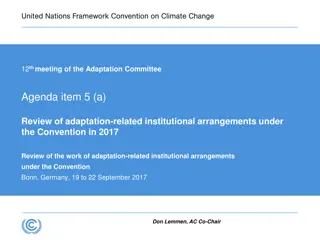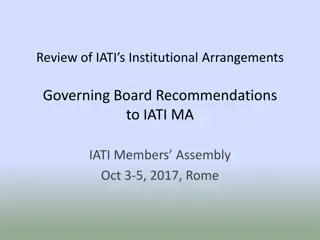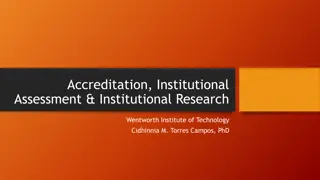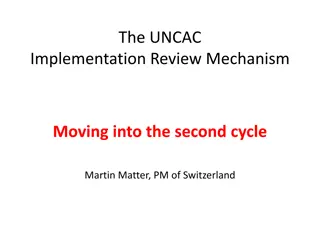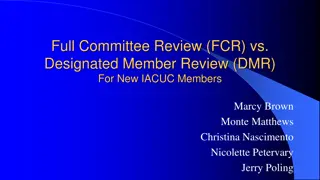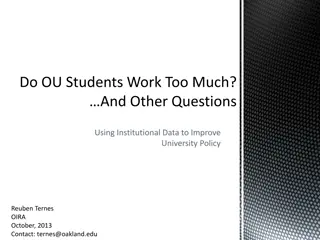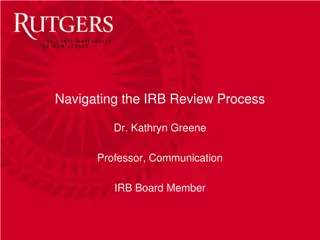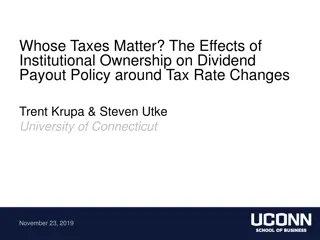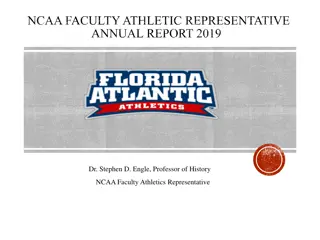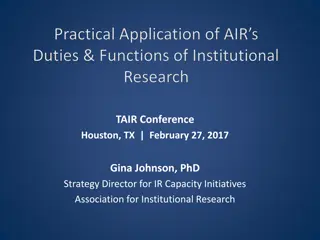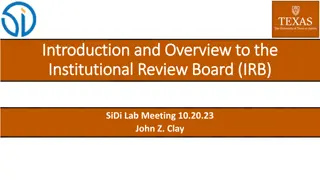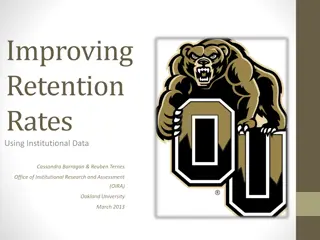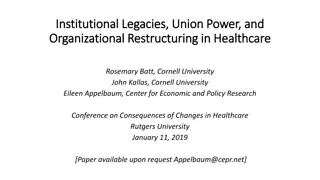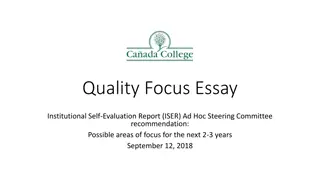Importance of literature review
A literature review is a critical component of any research endeavor, providing a comprehensive analysis of existing knowledge in a particular field. This review helps in clarifying conceptual issues, understanding research design, persuading examiners, and contributing new insights to the subject a
0 views • 28 slides
Understanding IRB Review Process for Expedited Research
Learn about the significance of IRB review, levels of review, and categories of expedited review. Discover the criteria for IRB review, including whether the study involves human subjects and contributes to generalizable knowledge. Explore the different levels of IRB review and the specific categori
4 views • 11 slides
INSTITUTIONAL GOVERNANCE FRAMEWORK
Currently, there is a lack of formal structure in the Institutional Housing Governance Framework (IHGF) within the public service system, leading to inefficiencies in managing institutional housing policies. This absence has resulted in deteriorating state assets, unmet housing demands, and ineffect
0 views • 17 slides
Rapid Review of BSL Commissioning Arrangements by Dr. Michael Brady
NECS commissioned a Rapid Review of British Sign Language (BSL) service provision to identify areas for improvement in access and patient experience, especially during the Covid-19 pandemic. The review focused on stakeholder engagement, options appraisal for commissioning responsibility, and recomme
9 views • 19 slides
Institutional Review Board
The Institutional Review Board (IRB) at AUCA plays a vital role in reviewing and approving research projects involving human subjects to ensure ethical standards are met. This includes obtaining informed consent, protecting privacy, and following international guidelines. Research must contribute to
0 views • 22 slides
Updates to Institutional Training Grant Applications - May 29, 2024
Changes are coming to Institutional Training Grant Applications to reduce burden and support a diverse biomedical research workforce. Updates include key changes to application forms, mentor training expectations, data tables, and peer review criteria. Learn more about the aims and scope of these ch
1 views • 17 slides
Understanding Institutional Review Board (IRB) and Research & Development (R&D) Committee Responsibilities
Explore the distinctions in roles and responsibilities of Institutional Review Boards (IRBs), VA Facility Research and Development Committees (R&D), and VA Facility Institutions in reviewing and approving human subjects research. Delve into key differences and examples of exceeding national policy o
2 views • 31 slides
Understanding Institutional Review Boards (IRB): A Comprehensive Overview
Institutional Review Boards (IRBs) play a critical role in reviewing, approving, and monitoring human subjects research to ensure their safety and rights are protected. This overview covers the functions of IRBs, different levels of review, types of studies, criteria for approval, and how IRBs deter
0 views • 12 slides
Pathology Department IRB Protocol for Electronic Medical Records Screening
Pathology Department's IRB protocol enables the screening of electronic medical records for research purposes, allowing members to review patient records and pathology slides. By fulfilling specific requirements and obtaining blanket IRB approval, researchers can access and analyze patient data for
0 views • 16 slides
Southern Illinois University Carbondale Office of Associate Provost for Academic Programs Review
The Program Review & Center/Institute Review at Southern Illinois University Carbondale aims to educate attendees on IBHE requirements, the review process, conflict of interest policies, self-study writing, on-site review involvement, financial support, and available resources. The IBHE mandates rev
0 views • 37 slides
Middle States Commission on Higher Education Self-Study Process
The Middle States Commission on Higher Education's self-study process involves organizing the study of institutional mission, goals, and objectives through working groups, drafting the self-study report, receiving feedback, and preparing the final report for accreditation. The mission is to ensure e
1 views • 8 slides
Understanding Institutional Review Board (IRB) Process
Institutional Review Board (IRB) plays a crucial role in ensuring research involving human subjects adheres to ethical standards. This summary provides insights into the IRB process, including determining the need for IRB review, defining human subjects research, and the importance of human subjects
0 views • 20 slides
Maximizing Institutional Impact through ACE Centers of Excellence
ACE Impact Centers of Excellence benefit from strong institutional support and are crucial for catalyzing broader teaching and research excellence. The DLI.7 framework outlines various elements that support global best practices in Higher Education, emphasizing the importance of institutional owners
0 views • 17 slides
Institutional Review Board (IRB) and Quality Assurance Overview
Institutional Review Board (IRB) plays a crucial role in protecting the rights and welfare of research participants, ensuring the validity, ethics, and compliance of human research. This content covers the functions of IRB as a Privacy Board, distinguishes Downstate and non-Downstate workforce inves
0 views • 27 slides
Slate Graduate School & International Admissions Review Forms Overview
Explore the process of submitting review forms and making admission recommendations in Slate Graduate School & International Admissions, including automatic assignment of applications to queues, review of Staff Review Forms, and recommending admission or denial through Faculty Review Forms. Learn ab
0 views • 8 slides
Review of Adaptation-Related Institutional Arrangements Under the Convention in 2017
The 12th meeting of the Adaptation Committee in Bonn, Germany, focused on reviewing adaptation-related institutional arrangements under the Convention in 2017. Recommendations were made to enhance coherence and respond to the evolving needs of Parties, including assigning future work to existing ins
0 views • 4 slides
Guidance on Single IRB (sIRB) Consultation for Multi-Institutional Studies
This resource provides detailed guidance on the requirements and processes for consulting with the Human Subjects Division (HSD) for single Institutional Review Board (IRB) studies involving multiple institutions, federally-funded research, and new NIH funding. It includes information on when a sIRB
0 views • 6 slides
Exploring Civic Virtue and Institutional Design in Early Modern Governance
Delve into the complexities of civic virtue and institutional design in early modern governance through a 3,000-word essay. Analyze the necessity of civic virtue within the state and consider contrasting perspectives on whether institutional design can replace it. Use primary texts to support your a
0 views • 32 slides
Impact of UN Guidelines on Foster Care and Institutional Care of Young Children in Europe and Central Asia
Professor Kevin Browne and Dr. Shihning Chou conducted a study on the impact of UN guidelines on foster care and institutional care of young children in Europe and Central Asia. The research highlights the physical harm and neural damage caused to children in institutional care without a parent. It
0 views • 11 slides
Phase 4 Progress Review Discussion Template Overview
This template guides a Progress Review discussion involving a Customer, Provider, and Key Stakeholders. It addresses the gaps in common business requirements, risk assessment confidence, deployment readiness, budget impacts, migration costs, and more. The template provides instructions for completin
0 views • 25 slides
Strengthening Legal and Institutional Frameworks for REDD+ in Republic of Congo
The Ministry of Forest Economics in the Republic of Congo, along with the National REDD Coordination, is actively identifying, evaluating, and strengthening the legal and institutional frameworks for the REDD+ process. Progress reports highlight the establishment of institutional arrangements, imple
0 views • 10 slides
Understanding Judicial Review in Administrative Law
In this chapter, the concept of judicial review in administrative law is explored, focusing on the scope of review set by Congress, including trial de novo and independent judgment on evidence. Different standards of review, such as clearly erroneous and substantial evidence, are discussed, highligh
0 views • 23 slides
Review of IATI's Institutional Arrangements and Board Recommendations
Review of IATI's Institutional Arrangements and Board Recommendations presented at the IATI Members Assembly in Rome, covering categories of recommendations, decisions made by the Board, and recommendations pending MA approval regarding governance issues.
0 views • 22 slides
Institutional Assessment & Research at Wentworth Institute of Technology
Wentworth Institute of Technology excels in accreditation, institutional assessment, and research. The institution's leadership program oversees accreditation efforts to ensure educational effectiveness. They focus on assessing student learning outcomes, measuring educational effectiveness, and cond
0 views • 5 slides
UNCAC Implementation Review Mechanism: Moving Towards the Second Cycle
The UNCAC Implementation Review Mechanism is progressing into its second cycle, with a focus on evaluating challenges and terms of reference at the conclusion of each review cycle. The performance assessment has highlighted achievements in enhancing awareness and involvement of civil society/private
0 views • 7 slides
Institutional Assessment and Effectiveness Workshop Achievements at SUNY Oneonta
The Office of Institutional Assessment and Effectiveness at SUNY Oneonta has made significant progress in developing assessment protocols and processes, leading to a culture of assessment. This includes completing planning and assessment cycles, establishing objectives and procedures, and aligning u
1 views • 16 slides
Understanding Full Committee Review (FCR) vs. Designated Member Review (DMR) for New IACUC Members
Explore the differences between Full Committee Review (FCR) and Designated Member Review (DMR) for new IACUC members. Learn the acceptable methods of protocol review, federal requirements, member responsibilities, risks, and best practices for protocol approval. Dive into the two valid methods of IA
1 views • 23 slides
Utilizing Institutional Data to Enhance University Policy: Insights from Oakland University Research
Extracting valuable insights from institutional data, the Office of Institutional Research and Assessment at Oakland University conducts various research activities to improve university policy. Through surveys and internal research, they address important questions like student workload, financial
0 views • 18 slides
Institutional Effectiveness and Assessment at B-CU
Jennifer Dash, Director of Institutional Assessment, and Dorian Hooks, Institutional Assessment Coordinator at B-CU, lead the efforts in understanding institutional effectiveness and assessment. Capacity building, creating a common vision, and a framework for institutional effectiveness are highligh
0 views • 35 slides
Understanding the IRB Review Process: A Comprehensive Overview by Dr. Kathryn Greene
Delve into the essential aspects of the IRB review process with Dr. Kathryn Greene, a professor and IRB board member. Explore the historical context, regulations, significance, and procedures involved in navigating the IRB review process. Gain insights into the importance of IRB in protecting human
0 views • 27 slides
Effects of Institutional Ownership on Dividend Payout Policy
This study examines how a firm's ownership structure, particularly institutional ownership, influences its dividend policy around tax rate changes. It explores the impact of tax-sensitive/insensitive institutional ownership, the role of dedicated institutions as monitors, and the interaction between
1 views • 26 slides
NCAA Faculty Athletics Representative Annual Report 2019
Dr. Stephen D. Engle, a Professor of History, serves as the NCAA Faculty Athletics Representative (FAR) and Chair of the Inter-Collegiate Athletic Committee. The report outlines the general responsibilities of the FAR, including overseeing sub-committees on Academic Performance, Institutional Contro
1 views • 13 slides
Guidelines and Regulations for Science and Engineering Fair Projects
Ensure completeness of required forms before conducting any experimentation for the Collier Regional Science and Engineering Fair. Local rules take precedence over state and international rules. Projects involving vertebrate animals, hazardous biological agents, or chemicals require approval from th
0 views • 13 slides
Role and Functions of Institutional Research in Higher Education
This content discusses the importance of developing duties and functions for Institutional Research (IR) professionals in higher education institutions. It highlights the key responsibilities of IR, such as identifying information needs, collecting and analyzing data, serving as data stewards, and e
0 views • 21 slides
Guidelines for Research Incentive Payments in Sponsored Projects
Research incentive payments play a crucial role in encouraging participation in research projects. This involves providing individuals with incentives such as cash or gift cards. However, it is essential to adhere to IRS reporting requirements, track incentives carefully, and comply with institution
0 views • 7 slides
Introduction to Institutional Review Board (IRB): Overview and Application Process
This detailed content provides an introduction and overview of the Institutional Review Board (IRB), covering its history, purpose, application process, and available resources. The IRB ensures that research involving humans adheres to ethical principles and regulatory requirements to protect partic
0 views • 4 slides
Opportunities to Mobilize Institutional Investment in Capital Markets
Aligning trillions of dollars managed by OECD institutional investors towards green infrastructure investments presents a significant opportunity. Currently, only a small percentage of large pension fund assets are directed towards infrastructure, with an even smaller fraction allocated to green pro
0 views • 4 slides
Enhancing Student Retention Rates through Institutional Data Analysis
Explore how Oakland University's Office of Institutional Research and Assessment leverages various data sources, policy analysis, and predictive modeling to improve student success and retention. Discover the role of IR offices, available resources, survey data, and the importance of collaboration f
0 views • 33 slides
Examining Union Power and Institutional Legacies in Healthcare Organizational Restructuring
Challenges faced by healthcare unions due to institutional legacies and shifts in the healthcare system are explored. The study delves into the variation in union success, emphasizing local institutional contexts in the U.S. and power dynamics between employers and unions rooted in historical contin
0 views • 16 slides
Institutional Self-Evaluation Report: Quality Focus Areas for Future Growth
The Institutional Self-Evaluation Report recommends key focus areas for the next 2-3 years to enhance student learning and achievement. Projects include addressing barriers to entry, streamlining processes, enhancing student support programs, and improving institutional effectiveness through plannin
0 views • 5 slides
